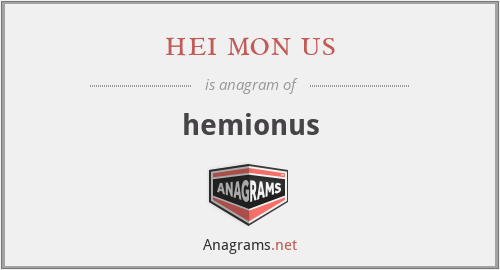What anagrams are available for hemionus?
This page is about an anagram for the word hei mon us that can be used in word games, puzzles, trivia and other crossword based board games.
hei mon us
Translation
Find a translation for hei mon us in other languages:
Select another language:
- - Select -
- 简体中文 (Chinese - Simplified)
- 繁體中文 (Chinese - Traditional)
- Español (Spanish)
- Esperanto (Esperanto)
- 日本語 (Japanese)
- Português (Portuguese)
- Deutsch (German)
- العربية (Arabic)
- Français (French)
- Русский (Russian)
- ಕನ್ನಡ (Kannada)
- 한국어 (Korean)
- עברית (Hebrew)
- Gaeilge (Irish)
- Українська (Ukrainian)
- اردو (Urdu)
- Magyar (Hungarian)
- मानक हिन्दी (Hindi)
- Indonesia (Indonesian)
- Italiano (Italian)
- தமிழ் (Tamil)
- Türkçe (Turkish)
- తెలుగు (Telugu)
- ภาษาไทย (Thai)
- Tiếng Việt (Vietnamese)
- Čeština (Czech)
- Polski (Polish)
- Bahasa Indonesia (Indonesian)
- Românește (Romanian)
- Nederlands (Dutch)
- Ελληνικά (Greek)
- Latinum (Latin)
- Svenska (Swedish)
- Dansk (Danish)
- Suomi (Finnish)
- فارسی (Persian)
- ייִדיש (Yiddish)
- հայերեն (Armenian)
- Norsk (Norwegian)
- English (English)
Definition
What does hemionus mean?
- hemionus
- The onager (; Equus hemionus ), also known as hemione or Asiatic wild ass, is a species of the family Equidae native to Asia. A member of the subgenus Asinus, the onager was described and given its binomial name by German zoologist Peter Simon Pallas in 1775. Five subspecies have been recognized, one of which is extinct. The Asiatic wild ass is larger than the African wild ass at about 290 kg (640 lb) and 2.1 m (6.9 ft) (head-body length). They are reddish-brown or yellowish-brown in color and have broad dorsal stripe on the middle of the back. Unlike most horses and donkeys, onagers have never been domesticated. They are among the fastest mammals, as they can run as fast as 64 km/h (40 mph) to 70 km/h (43 mph). The onager is closely related to the African wild ass, as they both shared the same ancestor. The kiang, formerly considered a subspecies of Equus hemionus, diverged from the Asiatic wild ass and has been acknowledged as a distinct species.The onager formerly had a wider range from southwest and central to northern Asian countries, such as Israel, Saudi Arabia, Iraq, Jordan, Syria, Afghanistan, Russia, and Siberia; the prehistoric European wild ass subspecies ranged through Europe until the Bronze age. During early 20th century, the species lost most of its ranges in the Middle East and Eastern Asia. Today, onagers live in deserts and other arid regions of Iran, Pakistan, India, and Mongolia, including in Central Asian hot and cold deserts of Kazakhstan, Uzbekistan, Turkmenistan, and China.Other than deserts, it lives in grasslands, plains, steppes, and savannahs. Like many other large grazing animals, the onager's range has contracted greatly under the pressures of poaching and habitat loss. Previously listed as Endangered, the onager has been classified as Near Threatened on the IUCN Red List in 2015. Of the five subspecies, one is extinct, two are endangered, and two are near threatened; its status in China is not well known. Persian onagers are currently being reintroduced in the Middle East as replacements for the extinct Syrian wild ass in the Arabian Peninsula, Israel and Jordan.
Embed
Citation
Use the citation below to add this anagram to your bibliography:
Style:MLAChicagoAPA
"hei mon us." Anagrams.net. STANDS4 LLC, 2024. Web. 18 May 2024. <https://www.anagrams.net/term/5838450>.



Discuss this hemionus anagram with the community:
Report Comment
We're doing our best to make sure our content is useful, accurate and safe.
If by any chance you spot an inappropriate comment while navigating through our website please use this form to let us know, and we'll take care of it shortly.
Attachment
You need to be logged in to favorite.
Log In